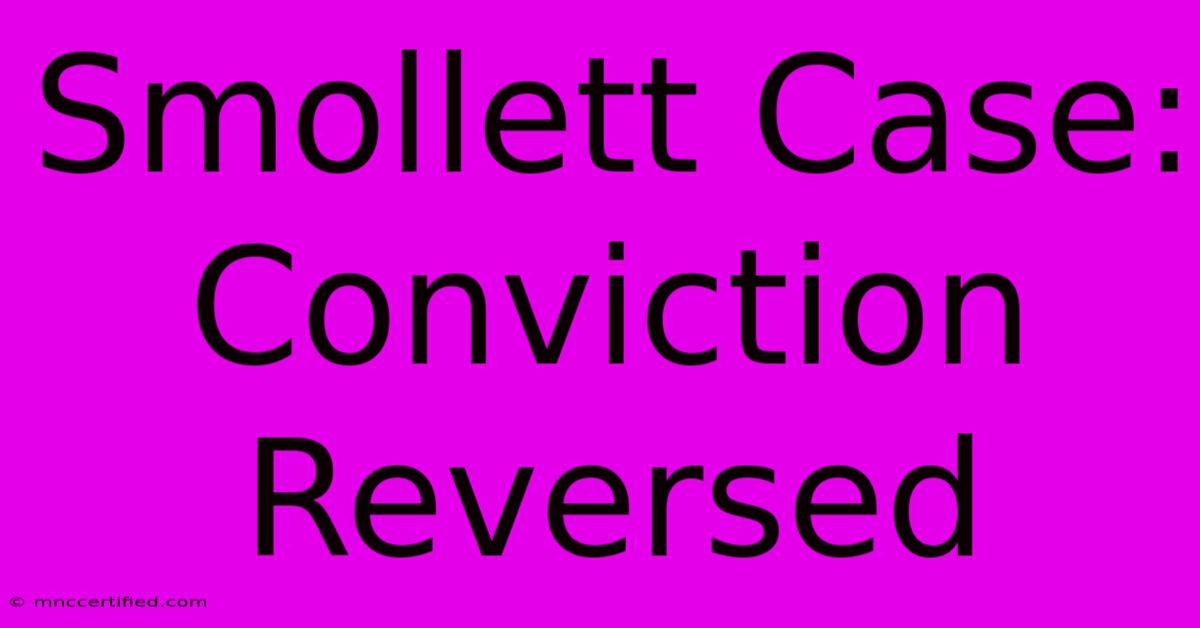Smollett Case: Conviction Reversed

Table of Contents
Smollett Case: Conviction Reversed – A Deep Dive into the Controversial Verdict
The case of Jussie Smollett, the actor accused of staging a hate crime against himself, has captivated the nation and sparked intense debate. His initial conviction was overturned, leading to widespread confusion and renewed scrutiny of the legal proceedings. This article delves into the details of the Smollett case, examining the initial accusations, the trial, the subsequent reversal, and its broader implications.
The Alleged Hate Crime and Initial Charges
In January 2019, Jussie Smollett, then a star on the television show Empire, reported to Chicago police that he had been the victim of a brutal hate crime. He claimed two men attacked him, shouting racial and homophobic slurs, poured bleach on him, and placed a noose around his neck. The incident immediately sparked outrage and widespread condemnation. However, as the investigation progressed, inconsistencies emerged in Smollett's account, leading to increased skepticism.
The Investigation and Arrest
Chicago police launched a thorough investigation, scrutinizing Smollett's claims and collecting evidence. Their inquiry eventually led to Smollett's arrest and charges of disorderly conduct for filing a false police report. The police alleged Smollett had orchestrated the entire incident with two brothers, Abimbola and Olabinjo Osundairo, who were later implicated in the alleged hoax.
The Trial and Initial Conviction
Smollett’s trial was highly publicized, attracting significant media attention. The prosecution presented evidence suggesting Smollett had paid the Osundairo brothers to stage the attack, aiming to increase his public profile and garner sympathy. The defense argued that Smollett was a victim of a genuine hate crime and that the brothers were motivated by other factors.
Key Evidence and Arguments
- The Osundairo Brothers' Testimony: Their testimony was pivotal, detailing their alleged involvement in staging the attack at Smollett's direction. They described the logistics of the event, including the purchase of supplies and the staging itself.
- Financial Records: Evidence presented showed payments made by Smollett to the Osundairo brothers around the time of the alleged incident.
- Smollett's Testimony: Smollett maintained his innocence throughout the trial, claiming he was the victim of a hate crime. However, inconsistencies in his statements and interactions with law enforcement were highlighted by the prosecution.
The jury ultimately found Smollett guilty on five of the six counts of disorderly conduct. This resulted in a conviction and a sentence, though this was later overturned.
The Reversal of the Conviction
In a surprising turn of events, Smollett's conviction was overturned. The judge presiding over the case ruled that the special prosecutor who handled the case had exceeded their authority and that the jury should not have considered evidence pertaining to certain aspects of the case, essentially nullifying the conviction. This ruling sparked considerable controversy and debate, raising questions about the legal process and the fairness of the initial trial.
Reasons for the Reversal
The decision to overturn the conviction centered on issues surrounding the special prosecutor's appointment and their conduct during the trial. The judge argued that the special prosecutor's involvement violated Smollett's due process rights, leading to the reversal. This aspect of the case remains a point of significant legal discussion.
Implications and Lasting Effects
The Smollett case has had far-reaching implications, impacting public trust in law enforcement and the justice system. It also highlights the complexities of investigating and prosecuting alleged hate crimes, underscoring the need for thorough investigations and careful consideration of all evidence. The case continues to serve as a cautionary tale about the potential consequences of filing false reports and the importance of due process in the legal system. The debate surrounding the reversal of the conviction will likely continue for years to come, shaping discussions on prosecutorial overreach and the fairness of the legal system.
Keywords: Jussie Smollett, hate crime hoax, conviction overturned, Chicago, special prosecutor, disorderly conduct, false police report, due process, legal implications, media coverage, trial, jury.

Thank you for visiting our website wich cover about Smollett Case: Conviction Reversed. We hope the information provided has been useful to you. Feel free to contact us if you have any questions or need further assistance. See you next time and dont miss to bookmark.
Featured Posts
-
Motorcycle Insurance San Antonio
Nov 22, 2024
-
Pratt Insurance Agency Girard Pa
Nov 22, 2024
-
Rooneys Reaction To Waynes Escort Letter
Nov 22, 2024
-
Arsenal Juventus Womens Ucl Match Result
Nov 22, 2024
-
E Coli Recall Ground Beef Products List
Nov 22, 2024